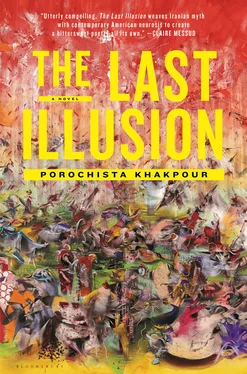But all that played in his head was her silvery syllables, her wants, her “asiya mcdonald / see you soon” scrawl. She would be the only being on earth who would get his soon this time. The Silbertorium went uncalled, his father was left unheeded.
Zal went over to her house, in an almost entranced autopilot. He never even asked her to repeat her address. He simply just knew it — subway to the park, across the park, up four blocks to that big grocery store, past the museums, and there: the red townhouse with the black iron gate in front of it, next to all the gateless white townhouses. When he got to the top of the steps just outside the door, she appeared.
“How did you know the exact second I was coming?” was the first thing he asked her.
She, looking as serious and as unsmiling as during their initial encounter, said simply, “I know things, Zal, didn’t I tell you? And of course, I was looking out the window. Not for you, really. I just do that.”
She did not invite him in, just stood there in front of the door and looked him up and down.
He looked down at his gray overcoat and gray trousers, black wool cap. He did not think he looked any different from yesterday.
He gestured inside. “Shall I—”
She shook her head. “Willie is being a horrible whiny pain today, and Zach has too many friends over playing awful music, and I just want to go to my studio. I thought you might want to see my work!”
Zal nodded slowly. The birds — he remembered her words immediately: I use them. For work. . I bring them back to life, of course . He hoped this was not the beginning of their end already.
“You don’t want to?” She looked narrowly crestfallen.
“I am curious,” he said quietly.
I do art, she had said. He tried to focus on that word art, a nice clean word.
“Oh, gosh! Zal, I totally forgot!” She put a hand over her mouth; it was unclear whether the gesture was intended to cover laughter or horror. She shook her head over and over, tragically, comically, tragicomically, it was hard to say. “The dead-bird stuff! That must have totally freaked you out!”
Zal shrugged.
“Oh, shoot. Yeah, well, it’s the series I’ve been working on for a while. I mean, there’s no way to sugarcoat it: they’re birds, dead ones, in various stages of decay. I mean, maybe it’s too much?”
Zal shook his head, even though he wasn’t that sure. He just knew he wanted to be around Asiya, that somehow having a new friend — and a female one! — was good, dead-bird art or not. “You never. . do anything to them, do you?” He didn’t know how else to say it.
Asiya squinted her eyes. “ Do anything? I do a lot of things.”
“But,” Zal sighed, “you don’t — I mean, you’re not the one who — before they — you don’t, you know. .”
She did know, finally. She put an arm on his shoulder and he shuddered in joy — he hoped imperceptibly — at that exotic feeling of human-on-human contact. “Zal, I am not the one who hurts them. I find them like that; I find them dead.”
Zal nodded, a bit ashamed at how it might have seemed: an accusation perhaps. “I didn’t think you did, Asiya.”
“But you don’t know me at all, really. That’s okay.”
“That’s true.”
“It’s funny, you got so upset yesterday when I said we were strangers,” she said, nudging his arm along as they walked toward wherever in that city her studio was, Zal in total blissful blindness.
“But yesterday was so strange,” Zal muttered. “I mean, I never had a day like that. By the end, I really felt like I had known you my whole life. I forgot what my actual life looked like.”
Asiya nodded. “I know. But you were right. I think we have known each other longer than we think.”
Zal looked at her to see if she was somehow joking or even being completely serious, but her eyes were turned upward, lost in apparently nothing but overcast city sky.
“I don’t know what you mean,” he said.
“Don’t worry,” she said, and she quickened her stride.
Zal quickened his.
They watched the city pass them by without seeing it at all, like characters in a dream, everything familiar just an irrelevant frame of motion picture passing along.
She finally said something at a crosswalk where a red flashing hand warned them against moving on. “People are always forgetting with you, aren’t they?”
“What?”
“The bird stuff. Like when I mentioned my art. I had forgotten already. People must forget.”
“No one knows. Or, few people. Well, I only know a few people.”
“But even them. It’s easy to screw up.”
“For some people it’s the first thing they think when they see me.”
She shook her head emphatically, furiously even. “Not me, Zal. I had forgotten already. I almost don’t believe it.”
“It’s true.”
“I know. I almost can’t believe it.”
“Well, okay.”
“There must be people like me, who come to care very much about you, who forget the whole thing and suddenly shove it in your face without knowing.”
Zal shrugged. He wanted to change the subject, but he didn’t. “It comes up less than you think. Lucky for me, the whole world is not a mess of birds, dead or whatever.”

People like me, who come to care very much about you.
He had heard that right, he thought, he had heard that exactly.
My God, he thought as the light turned green. Something was happening.
A few years ago, when Hendricks had finally sat him down to explain how human life was created, he had begun like that: When two people like each other, who come to care very much about each other. .

Her studio: it was the second studio he had seen in the past few weeks, if the Silbertorium could be called a studio, if his work could even be seen as a sort of art. This studio was very different, all the way at the end of the island — though only a sliver of water away from BXS’s — and very small, very simple: one large drawing table, another type of table, two counter stools, one small window. In some ways it looked like a cell, in others like a — dare he say it — cage.
Her words, not his.
“Welcome to my little cage!” she announced as they came in. She caught herself: “See, I did it again! I’m serious, I didn’t say that on purpose. I just think that to myself because of all the birds in here, not because of you!”
Zal nodded glumly. He smelled something that did not smell right. He looked to the small wooden boxes by the open window. “Well, cages have living birds in them anyway.”
“That’s true. . Do you really want to see this stuff, Zal? I suddenly feel weird about bringing you here. I mean, you really do?”
Really: no, Zal did not. But he didn’t want to tell her that, and he thought he could shake the feeling anyway. He wanted the girl to know that he supported what she did — after all, she had taken his story without a qualm, a judgment, without horror, disbelief. She had taken him in just as he was — he owed her the same, he felt.
“My story didn’t upset you, did it, Asiya?”
She shook her head. “Why should it?”
“It’s unusual. People don’t run into a story like mine.”
“That’s true. But it’s an interesting one.” She picked up one of the small boxes, looked inside, and quickly sprayed the contents with something chemical-smelling. “Why, have people judged you badly in the past? Freaked out?”
Zal shook his head. “I really haven’t been close to anyone after it all happened. Just my father, my doctor.”
Читать дальше














